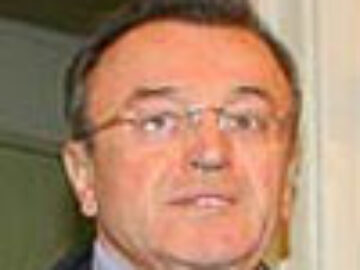Mikhail Marynich: “Belarusian authorities hush up awful things”

Hearings “Chernobyl today,“ dedicated to the situation in Belarus, were held in the European Parliament on 17 April. Members of the working group on Belarusian affairs, representatives of the European Commission, and delegations of democratic forces and civil society in Belarus took part in the hearing. The Charter’97 press center talks about the hearing in Brussels with Mikhail Marynich, former political prisoner and member of the organising committee of the civil campaign “European Belarus.”
– Mr Mikhail, how the hearing in the European Parliament was held?
– Yesterday was a very eventful day. The hearing began in the morning. It was opened by Edward McMillan Scott, Vice-President of the European Parliament. Laima Andrikiene, head of the European Parliament Committee on Human Rights prepared the hearing, which was attended by more than 50 MPs. Professor Yury Bandazheuski, academician Ivan Nikitchanka, deputy head of the Belarusian Popular Front party Vintsuk Vyachorka, head of the public association “Union Chernobyl-Belarus” Alyaksandr Vauchalin, lawyer Harry Pahanyaila, and Jacek Protasiewicz, MEP, chairman of the Delegation for Relations with Belarus, presented papers on the hearing. We discussed the present demographic situation in Belarus, the health of the Belarusian nation, who continues to suffer from the Chernobyl disaster consequences.
Professor Yury Bandazheuski, who had to move from Belarus to Vilnius, was an “engine” of this conference. He is intent on helping his native country in overcoming the Chernobyl disaster consequences.
– What problems were the main on the hearing?
– The most awful thing is that deaths exceed births twofold. The members of the European Parliament were shocked with this fact. Professor Bandazheuski is sure radiation is still dangerous for the health of the Belarusians. But the Belarusian authorities today reject there are problems, connected with the Chernobyl nuclear plant accident. Both representatives of Belarus and members of the European Parliament mentioned it. How these awful things can be hushed up today? Such high mortality rate – isn’t it a problem? The policy conducted by the authorities towards their own people is cynical.
A resolution was adopted, calling on the authorities to pay more attention to Chernobyl accident problems. If measures on improving the situation are not taken, the population of Belarus may reduce to 6 million people in 10-15 years. Spending funds, provided for humanitarian aid to Belarus should be put under International control. All possible should be done for this money can reach target under the control of the civil society, not be distributed among officials. An issue of the Belarusian liquidators of the Chernobyl disaster consequences, deprived of practically all their social privileges by the authorities, was also raised.
– Was the political situation in Belarus discussed in Brussels?
– Sure. Everyone understands Chernobyl problems in Belarus can’t be solved without democracy. All speakers called not to allow vote fraud at the coming parliamentary elections in Belarus. I told about the civil campaign “European Belarus,” about introduction of the European values to Belarusians. I told about Solidarity Day, holding every 16 day of a month in Belarus. We raised a question of political prisoners, spoke about immediate release of Alyaksandr Kazulin and other prisoners of conscience, about accepting of 12 proposals of the European Union by the authorities.
I met with Henrik Kroner, Secretary General of the European Movement, and his colleagues during my visit to Brussels. All of them spoke that freedom and democracy must come to Belarus and our country should be integrated into Europe.
– What is a unique character of the hearing in the European Parliament?
– It is a call of the Belarusian democrats to the European community, informing Europe about the problems, Belarus have faced after the accident on the Chernobyl nuclear plant. It was decided to create an independent center, which task would be to inform about Chernobyl problems and help the victims of the disaster, including liquidators. It was said such hearing should be organised every year, in order the Chernobyl question be discussed, because the hushing up practice is harmful both for Belarus and the European countries.
